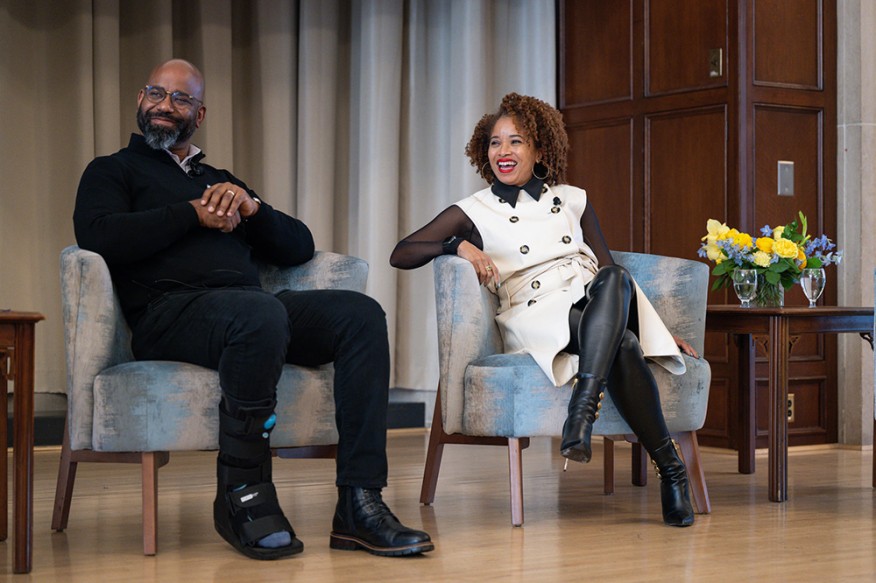At the third annual Social Justice Changemaker Lecture, keynote speakers Nicole Fleetwood and Reuben Miller headlined a program entitled “Incarceration and its Aftermath: How Art Can Create Pathways to Reintegration and Healing.” The lecture began and ended with live performances from Ansar Harris and Marjani Abdur-Rahman, whose art addressed their lived experience during and after incarceration. Current MSW student Lady Funcke shared her personal reflections about the stigma and roadblocks she faced after her incarceration.
“Today I stand before you as a living testament of the power of second chances, the strength of human spirit and the profound impact of community love and support,” said Funcke.
Fleetwood is a MacArthur “Genius,” a celebrated writer, cultural theorist, curator and art critic. She is the author of several books including “Marking Time: Art in the Age of Mass Incarceration,” which was inspired in part by the direct impact excessive policing, punitive surveillance and mass incarceration has had on her own family. She is the inaugural James Weldon Johnson Professor of Media, Culture, and Communication in the Steinhardt School at New York University.
Miller is also a MacArthur “Genius Grant” Fellow and is the author of “Halfway Home: Race, Punishment, and the Afterlife of Mass Incarceration.” He is a sociologist, criminologist and a social worker who teaches at the University of Chicago in the Crown Family School of Social Work, Policy and Practice, where he studies and writes about race, democracy and the social life of the city. Miller was an assistant professor at the School of Social Work from 2013-17.
The conversation, which was moderated by Associate Professors M. Candace Christensen and Camille Quinn, touched on the personal and societal implications of the carceral state, the connection between creativity and freedom, and the importance of imagination and inclusion.
Miller explained how the experience of incarceration in our country is much more commonplace than we realize: half the population has had a friend or loved one who has been incarcerated. “Jail and prison is the only response to all manner of social problems,” he said. “You’re homeless: go to jail; you're stuck with an addiction: go to jail; you kill someone: go to jail or prison. Why is this the only way to address an issue? It looks like a fear-based response, where the only impetus for government is protection.”
“Prisons can only exist through isolation,” said Fleetwood. “There’s no logic that can support prisons if you don’t believe in radical division and isolation.”
Miller described how punishment breaks relationships from the moment of accusation, and how it separates people from their families, friends and peers. “In prison, we separate people from society, from the economy, from political life, from culture.” The result is that we “fail forward,” said Miller. “What does it mean to lock off all that creativity?”
Fleetwood spoke of the small pieces of art that her cousin made and sent her while he was incarcerated, and how she became aware of the practice of art being created in prisons. Through this art, she saw the development of a voice and a dialogue. She began seeing art as a practice of love and belonging. “These practices were transforming their social life inside prison … rethinking what it means to survive incarceration, what it means to take time as punishment and transform it into radical acts of creativity, and also resisting the mandate of incarceration, which is isolation, deprivation, devaluation. It was a radical reimaging of what it means to be a person of value, someone who discerns, someone who gives and shares.”
“The long history of captivity is the long history of freedom dreams. We aren’t meant to be locked up; we’re not meant to be contained,” said Fleetwood. “Art radically manifests the creative capacity of humans, and we are meant to dream and co-create and build collectively. I think art becomes really the blueprint for that way of living.”
The connection between imagination and art led to a conversation about hope and the importance of community. Both Fleetwood and Miller used the word “sacred” to describe the critical function of gathering and the role it plays in strengthening relationships and stopping cycles of violence.
The program also included art by members of the U-M’s Prison Creative Arts Projects’ Linkage Community, an alliance of artists and creators with lived experience in prison who are interested in deepening their craft in spaces of radical acceptance and authentic connections.
The Social Justice Changemaker Lecture was established by a generous gift from Dr. Neil C. Hawkins and Annmarie F. Hawkins, and the Hawkins Family. This annual lecture focuses on important global social justice issues including race and nationality, immigration and refugees, income inequality, gender identity and sexual orientation, education, health, and mental and physical disabilities.
The Social Justice Changemaker Lecture aims to bring prominent social justice experts and advocates from multiple disciplines including social sciences, science, humanities, the arts and other professions to the University of Michigan campus.



















































































































































































































